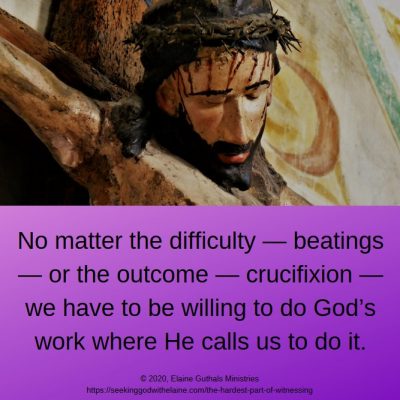How did Paul witness to people? Was he the planter, waterer, or harvester? This devotion looks at the role Paul took and why.
Nuggets
- Paul had the knowledge to establish a firm foundation.
- No matter the difficulty or the outcome, we have to be willing to do God’s work where He calls us to do it.
- God will give us success.

We like to think of witnessing as a team effort. That can give us more confidence to do the witnessing.
Generally, we think of the team as one who plants the seed, one who waters, and one who harvests. The planter would have the hardest part, especially if the person had no prior knowledge of God’s love for them.
Where was Paul on the team?
Foundation Work
“My aim is to preach the gospel where Christ has not been named, so that I will not build on someone else’s foundation” (Rom. 15: 20 CSB)
Hmmm. What happened to the “plants, waters, and harvests” deal? Is Paul not a team player?
Well, yes, Paul is — but we have to go to First Corinthians 3: 10 to find that out. “According to the grace of God given to me, like a skilled master builder I laid a foundation, and someone else is building upon it. Let each one take care how he builds upon it” (I Cor. 3: 10 ESV). Paul was the one doing the planting.
So, Paul wanted to be the starter, not the closer. You know. I can see that.
Paul took the hardest part of witnessing — teaching where there may be no building blocks on which to hook the information.
Who was Paul? Paul was a Roman citizen born in the city of Tarsus. He was born to a Jewish family.
Beyond learning at the synagogue school, Paul studied under Gamaliel, a famous rabbi at the time. He was successful in his studies. “I advanced in Judaism beyond many contemporaries among my people, because I was extremely zealous for the traditions of my ancestors” (Gal. 1: 14 CSB).
A Pharisee (Phil. 3: 5), Paul learned the trade of tentmaking. He was very adamant in supporting himself in his ministry (Ac. 18: 3).
Being a traditionalist, Paul at first rejected the message of the gospel. His rejection was so strongly that he persecuted believers.
Then Jesus met Paul on the Damascus Road. The change was immediate. True, believers at first wasn’t sure about his conversion, but they were convinced by his conviction and dedication.
For me, it comes back to the “… beyond many contemporaries among my people …” (Gal. 1: 14 CSB) part. Paul had the background knowledge of the Scriptures. He had been training for this his whole life to be able to defend the gospel.
But I have to tell you, I first read this verse and thought, “Is Paul saying this because of pride?” We talked a little in the last devotion about Paul only boasting in Jesus. Did he contradict himself one verse later?
Paul had the knowledge to establish a firm foundation. Others may not have.
I’ve said before that my Ladies and I call Paul the Energizer Bunny. He worked and worked to spread the gospel because that is what it took. Laying a foundation is hard work — especially to those that find this a foreign concept, as the Gentiles would
Also, Jesus gave Paul his marching orders to go to the Gentiles. The Twelve Apostles — because Judas had been replaced by the new guy – focused on witnessing to the Jews. There were a lot less workers witnessing to the Gentiles.
Paul had to have confidence in himself. Let’s face it, he didn’t have an easy life. All the traveling, no real steady income, distrust from his audience at the beginning of his ministry. If he would have shown any doubts about his calling or his message, he would have been sunk.
Today, someone has a problem in retail, they demand to see the manager. The “manager” in Paul’s situation would have been one of the Twelve Apostles. But Paul defended himself vehemently when his apostleship was called into question.
Getting It Anyway
“but, as it is written, Those who were not told about him will see, and those who have not heard will understand” (Rom. 15: 21 CSB)
Okay. This is confusing me. It seems like the connection is only in Paul’s mind. So, let’s hook it back with the last verse and take another pass at it.
“My aim is to preach the gospel where Christ has not been named, so that I will not build on someone else’s foundation, but, as it is written, Those who were not told about him will see, and those who have not heard will understand” (Rom. 15: 20-21 CSB)
Paul was quoting Isaiah 52: 15. This is part of the Suffering Servant chapter. Isaiah was prophesying how thoroughly Jesus would be beaten. “… his appearance was so disfigured beyond that of any human being and his form marred beyond human likeness” (Isa. 52: 14 NIV). They wouldn’t know Him by looking at Him.
So, what does that have to do with Paul and his taking the difficult areas to witness?
No matter the difficulty — beatings — or the outcome — crucifixion — we have to be willing to do God’s work where He calls us to do it. Maybe no one has been there before. If we are being called, we need to lay the foundation.

God will give us success. Oh, yes. At times, the success may be wrapped in bruises — or worse. But God has said that “…my word that comes from my mouth will not return to me empty, but it will accomplish what I please and will prosper in what I send it to do” (Isa. 55: 11 CSB).
Making the Connections
Haldane made a very good point. He wrote, “Whenever the Lord has work to do, He raises up men with a heart to perform it. This, however, is no excuse at any particular time for indifference or want of effort to spread the gospel.”
God is going to do things on His timing. When the time is right, He will have all the resources ready to get it accomplished. The people are going to be there. Money will be available. Time will not be an issue.
God’s Will will be done.
We’ve talked before that every single person will have the opportunity to accept the gospel before Jesus returns. “And this gospel of the kingdom will be preached in the whole world as a testimony to all nations, and then the end will come” (Mt. 24: 14 NLT). Everyone must make a decision.
Let’s go back to pride a second. We have to have some pride in our work. I mean, we are working in an area that will have eternal consequences. We should be doing our best for our Lord.
But we do need to be humbled that God is using us. He doesn’t need us. We need Him.
God will grow us as we do His work. That is how He changes us and refines us.
How Do We Apply This?
- We should pray for the desire to do God’s work.
- We need to go where God calls us.
- We need to go where we are needed most. Redoing work of others may not be the best use of our time.
- We can’t shy away from the hard stuff. Satan is going to try to make it all hard.
- The unwanted jobs can be the most rewarding. Robinson wrote, “The truest ambition is to serve God in the best and most devoted manner.”
- Sometimes we need to start with the foundation for continuity’s sake.
- It is okay to want to leave our own mark in doing God’s work — we just have to keep the pride in balance.
God wants everyone to be saved. “This is good, and it pleases God our Savior, who wants everyone to be saved and to come to the knowledge of the truth” (I Time 2: 3-4 CSB).
How do they hear but that we tell them?
Father. We want others to have the joy that we have found in You. We want them to know Your love and provision. Help us to determine our roles in witnessing to others. Give us courage to approach people and the abilities to know what they need from us. Amen.
What do you think?
Leave me a comment below (about this or anything else) or head over to my Facebook group for some interactive discussion.
If you don’t understand something and would like further clarification, please contact me.
If you have not signed up for the email daily or weekly providing the link to the devotions and the newsletter, do so below.
If God has used this devotion to speak with you, consider sharing it on social media.
Pingback: Transformed to being Servants of God – Seeking God with Elaine